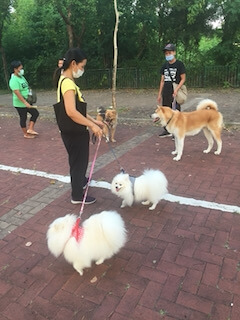I can't live without her anymore!
Now that we have talked about the legalities, it is also important to consider the lives of the people you are bringing to Tokyo, including their families. Let's take a look at how a family of businessmen living in Hong Kong can move to Japan.
When you are in Hong Kong, you will notice that there are many women working. Some of them have large bellies. In my work, I often have meetings with lawyers from law firms, and it is not unusual for all the attendees to be women. The reason for this is not so much that women are advancing in society or that they are more aware of gender equality, but simply that the helper system is in place.
The first day I lived in Hong Kong was a Sunday, and when I went out for a walk, I saw a lot of Asian women occupying the pavement, playing cards, eating sweets and having fun. Seating for some kind of event? A festival? I wondered. But later on, I understood why. (In Japan, neighbours would immediately complain about the noise and disturbance.
People in Hong Kong, both Hong Kongers and foreigners, even those who are not particularly wealthy, usually employ helpers. They are officially called Foreign Domestic Helpers and are available to both women and men. The most common tasks are general housework, looking after children, caring for elderly parents, but in wealthier areas they can also be drivers, gardeners and all sorts of domestic tasks. A friend of mine, married to a Hong Kong man, complained that her husband left his clothes on and never cleaned up after himself. I've been brought up that way since I was a little girl.
Thanks to these helpers, women can work outside the home as a matter of course. They don't need nursery schools and they don't need to take leave because their children are ill. They can work until the last minute during pregnancy and return to work as soon as they have given birth. You don't have to worry about quitting your job to care for your parents, or flying around looking for a home. When I talk to Hong Kong people I meet here, they usually ask me "So, what does your wife do? It's very common.
Helpers are employed on a special visa for helpers, which is separate from the normal work visa. This visa has some restrictions, such as it must be renewed every two years, it does not give you permanent residency even if you stay for a long time, and you cannot bring your dependants with you. However, the visa itself is relatively easy to obtain. On the other hand, there are many protections for helpers, such as a guaranteed minimum wage (about 70,000 Japanese yen per month for a live-in worker), an obligation for the employer to provide food and shelter, an obligation for the employer to pay for helper insurance, and an obligation to conclude a work contract with certain conditions. It is not possible to let them enter the country under the guise of trainees and work them hard for low wages, as is the case in some countries.
The helpers, especially the ones who do the housework, are trained in their home countries and their skills are quite good, although they are not always the best. The helper I have now, who lives in the house, always makes sure the toilets and bathrooms are as clean as a hotel, the laundry is never piled up, and the shirts and other items that have been washed are neatly ironed and lined up like the shelves at Uniqlo. The daily dog walks and care (two naughty Pomeranians) are also perfectly taken care of and nothing is too much trouble. It's only been a few years since I experienced the comforts of having a helper in Hong Kong, but I can't live without her. I can't live without her.
When you think about it, this makes a lot of economic sense, and is the best way to avoid the loss of work opportunities at a fraction of the cost of having one or both of the spouses lose them to housework, childcare or care.
But why don't we have this helper system in Japan? I remember that some years ago there was a system to give work visas to helpers from abroad, but I think (sorry if I'm wrong, I don't know much about it) that you have to take training at a specified place for a specified period of time for a fee (it's long and expensive), and pass an exam (was it this care helper who had to take a kanji test that even Japanese couldn't read? were these care helpers? To become an employee of a designated private company (concession?). The remuneration must be the same as other helpers in Japan (2-3,000 yen per hour) (in effect, making it harder to use foreign helpers?). These regulations make the system useless. This is another example where I don't know what they are looking at when they make the system. The introduction of the foreign helper system in Hong Kong (and Singapore) has led to many problems, such as the "nursery school dropout! The introduction of foreign helper systems in Hong Kong (and Singapore) is the best and most realistic way to solve the "nursery school failure" problem, the custom of leaving work after a long life, the problem of working conditions for parents with children, the problem of nursing care, and the problem of the M-shaped curve in the female employment rate. I was thinking about this when I came across this article in the Tokyo Shimbun. This is not good enough.

There are a number of other things that once you come to Hong Kong and get to know it, there's no going back. To be continued in the next issue.



